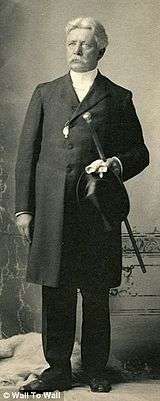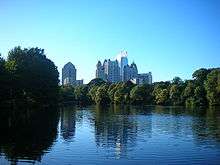Joseph Forsyth Johnson
Joseph Forsyth Johnson (1840 – 17 July 1906) was an English landscape architect and disciple of John Ruskin.

Early life and career

Johnson was the son of Joseph Johnson, a baker. He had a family background in horticulture. His Scottish maternal grandfather John Forsyth, a florist, was the son of William Forsyth, a botanist who co-founded the Royal Horticultural Society in 1804.[2]
Johnson had a successful career designing the grounds for a number of large houses in England, Ireland, and Russia. By 1869, he was the Curator of the Royal Botanic Gardens in Belfast.[1] He subsequently set up a landscape gardening shop on Bond Street in London.[1]
He went to the United States of America in 1885 where he was employed by Prospect Park in Brooklyn, New York City, as superintendent of horticulture.[1] The park was overgrown and his plan was to create a number of vistas so the entirety of the large park would be visible. This would have necessitated the removal of a large number of trees, which proved unacceptable to the community. As a result, Johnson was terminated from the project.
A recommendation in 1887 by New York florist Peter Henderson convinced Joel Hurt to bring Johnson to Atlanta to work on his streetcar suburb, Inman Park. Johnson went to Atlanta and he spent the next five years there. He joined Hurt again for Piedmont Park.
In 1891, he designed Latta Park in Charlotte, North Carolina and the next year may have designed the neighborhood of Cloverdale in Montgomery, Alabama.
Family
He married Elizabeth Trowsdale (born 1832) on 12 January 1861, by whom he had six children: John Forsyth Johnson (born 1861), Charles (born 1862), Georgiana Mary Alice (born 1864), Elizabeth (born 1868), Joseph and Christina (born 1873). He moved to America in 1885 with Frances Clarke, who was then pregnant and who was included on the passenger list as his wife. They had three children: Roy Albert Johnson (1886–1939), Cecil Forsyth Johnson (1887–1951), and Edwina Johnson Mundy (1891–1969). Johnson's great grandson by his first marriage was the British entertainer Bruce Forsyth (1928–2017). Forsyth appeared on the BBC One genealogy television show Who Do You Think You Are? researching his great grandfather Joseph, in particular any information relating to his American family.[1]
Despite the question of bigamy arising in this documentary, there is no record for Johnson's marriage to Frances Clarke, although she is shown to have been recorded as both Frances Clarke Johnson and Frances Forsyth Johnson.
Death
Johnson's American family were informed that he had died while travelling to Great Britain and had been buried at sea. In fact he had abandoned his American family just as he had previously abandoned his English wife and children. The reality was that he had returned to England to visit his family there, later going back to the United States. In the next decade he visited England on several other occasions before he died in Brooklyn, New York in 1906. Johnson was buried there at Evergreen Cemetery in an unmarked grave.[1] He died with only $389 to his name after living for several years in a hotel, leaving no last will or testament.[1]
After visiting his great grandfather's unmarked grave at Evergreens Cemetery, Bruce Forsyth commissioned a headstone in memory, to mark Joseph Forsyth Johnson's life and work.[3]
Writings
- The Natural Principle of Landscape Gardening: Or the Adornment of Land for Perpetual Beauty, Archer and Songs, Belfast, 1874
- Residential Sites and Environments, Their Conveniences, Gardens, Parks and Planting, A.T.Delamare, New York, 1898
- The Laws of Developing Landscape, Showing How to Make Thickets and Woodlands Reveal Their Natural Beauty, Journal of the Royal Horticultural Society 29 (1904–1905), p. 595–624
References
- "Bruce Forsyth". Who Do You Think You Are Magazine. Retrieved 24 July 2010.
- Barratt, Nick (24 November 2006). "Family detective: Bruce Forsyth". The Daily Telegraph. Retrieved 24 July 2010.
- Joseph Forsyth Johnson on Findagrave.com